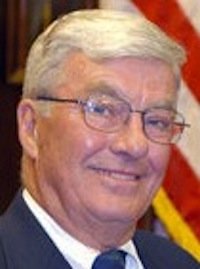Democrats to decide on Reilly or Reinhardt
ALBANY COUNTY — Democrats in District 33, which includes areas in New Scotland and Bethlehem, will decide at a caucus tonight who will represent them on the fall ticket for Albany County Legislature; incumbent Legislator Herbert W. Reilly Jr., of Voorheesville, is facing a new rival, Bethlehem Town Councilman William Reinhardt.
“Bethlehem has this vision that all representatives should live in the boundaries of Bethlehem,” Reilly told The Enterprise.
Reilly, 79, is an Albany-area native who continues to work at his family’s two funeral homes in Albany and Voorheesville. He cited his work, first as New Scotland town supervisor and later as a county legislator, to protect residents from unsafe water and to provide infrastructure from the rural Hilltowns down to suburban Bethlehem.
“We all relate to one another,” Reilly said. He applied to be on the Democratic Party and the Independence Party tickets this fall, he said. In 2011, he ran for, and won his seat, unopposed.
Reinhardt, 65, hails from California but has resided in Albany County since 1984. He retired from the New York State Energy Research and Development Authority in 2010, where he worked on projects involving renewable energy and evolving technologies. He is a founder of Solarize Albany, a volunteer group of Albany County residents who promote solar energy by leveraging the cost benefits of bulk purchasing of solar power.
“By definition, I have to run against Herb [Reilly],” Reinhardt told The Enterprise about trying to gain the party nod. “I just feel that we need changes at the county level. I have the energy and the expertise to move these things along.”
Reinhardt has legislative experience, he said, noting his work on Bethlehem’s town board since 2012. He said that, if elected to the legislature, he would resign from the town board.
“Without being critical,” he said, Reilly “hasn’t moved the ball forward,” Reinhardt said of his decision to seek a place on the Democratic ticket.
Water well bill
“One thing that Michael Mackey sponsored, and the county attorney, was Local Law B that protected water for private wells,” Reilly said of the bill the legislature unanimously approved last month for neighbors of areas where blasting is proposed during a slated pipeline expansion.
“I’m pushing for all the public supplies [to be protected],” Reilly said. He wants an addendum to be written to Local Law B to include protections for local reservoirs, he said.
“I don’t think the people of Bethlehem know the [Tennessee Gas Pipeline] goes underneath the Vly Reservoir,” Reilly said.
He recalled his experience as New Scotland’s supervisor when nitrates were discovered around a new water district, and an oil spill was discovered at John Boyd Thacher State Park. Because of fissures in area limestone known as Karst topography, he said, pollutants can “travel fast” to public water supplies. At that time, a water district was extended to Clarksville, Reilly said. He related the difficulty in finding safe water in New Scotland, and in keeping Bethlehem’s public water safe, with Tennessee Gas’s proposed pipeline expansion.
“You start blowing dynamite, this could easily dislodge this pocket of wastewater just above the Vly Reservoir,” Reilly said. “It could travel along old pipelines, or through fissures. You can’t fool around with it unless you know what you’re doing.”
In a letter Reilly shared with local news outlets, he wrote, “Dangerous gasoline and other byproducts don’t belong in our drinking water. Pipeline blasting near the Vly Reservoir will be very close to the North Road pocket of waste oil and could unintentionally release some of this pollutant into the Vly Reservoir.
“The reservoir already has 60-year-old gas transmission lines passing under its water,” Reilly’s letter continued.
Reinhardt questioned aspects of Local Law B when it was proposed, and his questions drew criticism by local residents. He responded to that criticism in a letter to the Enterprise editor this week (see Letters to the Editor).
“I openly stated my support for the first draft of the bill,” Reinhardt wrote about Local Law B. “However, changes to the bill’s language were subsequently made. Conversations with attorneys and engineers raised my concern that those changes might have unintended negative consequences for farmers, small businesses, and municipalities throughout Albany County.
“I publicly testified in favor of the bill before the county legislature on May 11,” Reinhardt wrote.
He told The Enterprise that he supports transparency in government, which, he said, includes recording all meetings to get away from “back-room deals.” Reinhardt said that he would like the county to hold a referendum about Local Law B.
“The public should have a say,” he said of the water well bill, which will not become law unless it is signed by the Albany County executive, Daniel McCoy.
Rail trail and oil
Reilly, a 27-time marathon runner, said that the rail trail, which is to eventually run from the Port of Albany to Voorhesville, has provided recreation opportunities for both New Scotland and Bethlehem residents, and is a natural right-of-way.
“I put a lot of work into that,” Reilly said about the creation of the Albany County Rail Trail. “That Rail Trail is my baby.
“We’ve allowed Bethlehem to use 9,000 feet [of the rail trail right-of-way] for a force sewer line to the Normanskill Creek,” he continued. The rail trail will be paved at that section, he said. The town was able to use the accessible rail trail rather than wind along roads and negotiate for private easements, Reilly said.
“That would have been well over $1 million,” he said. “They’re getting it for free.”
Reinhardt supports open space projects like the rail trail, he said.
“My wife uses the rail trail literally every day,” he said. He has followed the development of the relocation of the Hilton-LeVie historical barn and is concerned about environmental protection, he said.
Reinhardt supports “getting off fossil fuels,” he said.
“I’m a big opponent of the oil trains. It’s not just the Port of Albany,” he said. He noted the rails that run through Selkirk and behind the Hannaford plaza in Voorheesville.
“All over the county, we have these risks from the oil trains,” he said. Reinhardt said that oil and other fossil fuels being transported from Canada and from South Dakota could lead to global disaster.
“It’s real. It’s happening. We are not winning the game,” Reinhardt said about climate change. “Decisions made at the local level” can affect climate change, he said.
Perspectives
Reilly said that the Reformed Democrats in Bethlehem “want me out” because he does not live in Bethlehem, but he said that he has worked for the whole county during his time in public office.
“People from the city, they don’t know how important it is to take care of something in Potter Hollow,” Reilly said, noting how feeder creeks in the Hilltowns flow down to Bethlehem and Albany reservoirs. “I take care of the whole county. I look at infrastructure. That’s my job,” he said. “Water doesn’t run uphill.”
Reilly said that he was also involved in the expansion, and straightening, of Cherry Avenue in Bethlehem’s explosively-urbanized shopping and industrial area, “making sure everybody’s needs were met.”
He reiterated the benefits the rail trail have brought to the town of Bethlehem under his watch on the county legislature.
“That rail trail is going to be a financial boon to Bethlehem, and the money they’ve saved…they don’t get it,” Reilly said.
“I’m not a career politician,” Reinhardt said, noting his short-term public service following his work with NYSERDA and his private endeavors with clean energy development.
Reinhardt wants to streamline the permitting process in Bethlehem to be business-friendly for the solar industry, he said. Bethlehem will “save money” by “going after this aggressively,” he said.
He follows a “buy local, nurture local agriculture” philosophy, he said.
“There’s not much agriculture in Bethlehem. There’s probably more in New Scotland,” Reinhardt said.
He does not like the county’s approach to budgeting year to year, he said.
“The county should use a five-year budgeting process,” Reinhardt said. “You can’t foresee problems on the horizon with a one-year plan.”




